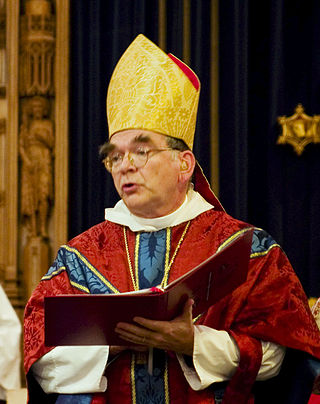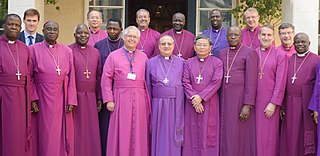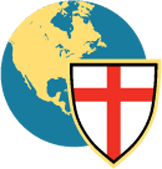
The Church of Nigeria is the Anglican church in Nigeria. It is the second-largest province in the Anglican Communion, as measured by baptised membership, after the Church of England. As of 2016 it gives its membership as "over 18 million", out of a total Nigerian population of 190 million. It is "effectively the largest province in the Communion." As measured by active membership, the Church of Nigeria has nearly 2 million active baptised members. According to a study published by Cambridge University Press in the Journal of Anglican Studies, there are between 4.94 and 11.74 million Anglicans in Nigeria. The Church of Nigeria is the largest Anglican province on the continent of Africa, accounting for 41.7% of Anglicans in Sub-Saharan Africa, and is "probably the first [largest within the Anglican Communion] in terms of active members."
The Confessing Movement is a largely lay-led theologically conservative Christian movement that opposes the influence of theological liberalism and theological progressivism currently within several mainline Protestant denominations and seeks to return them to its view of orthodox doctrine, or form a new denomination and disfellowship (excommunicate) them if the situation becomes untenable. Those who eventually deem dealing with theological liberalism and theological progressivism within their churches and denominations as not being tenable anymore would later join or start Confessional Churches and/or Evangelical Churches that continue with the traditions of their respective denominations and maintaining orthodox doctrine while being ecclesiastically separate from the Mainline Protestant denominations.
The Anglican Communion Network was a theologically conservative network of Anglican and Episcopalian dioceses and parishes in the United States that was working toward Anglican realignment and developed into the Anglican Church in North America.
The Anglican Mission in the Americas (AMiA) or The Anglican Mission (AM) is a self-governing church inheriting its doctrine and form of worship from the Episcopal Church in the United States (TEC) and Anglican Church of Canada with members and churchmen on a socially conservative mark on the liberal–fundamentalist spectrum of interpretation of the Bible. Among its affiliates is the Anglican Church in North America since their inception in June 2009, initially as a full member, changing its status to ministry partner in 2010. In 2012, the AM sought to clarify the clear intent of its founding by officially recognizing themselves as a "Society of Mission and Apostolic Works". At the same time, ceased its participation in the Anglican Church in North America and—in order to maintain ecclesial legitimacy—sought oversight from other Anglican Communion provinces.

Robert William Duncan is an American Anglican bishop. He was the first primate and archbishop of the Anglican Church in North America (ACNA) from June 2009 to June 2014. In 1997, he was elected bishop of the Episcopal Diocese of Pittsburgh. In 2008, a majority of the diocesan convention voted to leave the diocese and the Episcopal Church and, in October 2009, named their new church the Anglican Diocese of Pittsburgh. Duncan served as bishop for the new Anglican diocese until 10 September 2016 upon the installation of his successor, Jim Hobby.

The Reformed Episcopal Church (REC) is an Anglican church of evangelical Episcopalian heritage. It was founded in 1873 in New York City by George David Cummins, a former bishop of the Protestant Episcopal Church.
The Charismatic Episcopal Church (CEC), officially the International Communion of the Charismatic Episcopal Church (ICCEC), is a Christian denomination established in 1992. The ICCEC is a part of the Convergence Movement. Within North America, most of the Charismatic Episcopal Church's congregations and missions are located within the Northern, Southeastern, Midwest, and Western United States; it also has a presence in Texas, and in Western Canada.
Anglican doctrine is the body of Christian teachings used to guide the religious and moral practices of Anglicans.
The Convergence Movement, also known as the Ancient-Future Faith movement, is a Protestant Christian movement that began during the Fourth Great Awakening (1960–1980) in the United States.
The Church of Nigeria North American Mission (CONNAM) is a missionary body of the Church of Nigeria (CON). It has been in a ministry partnership with the Anglican Church in North America but no longer affiliated with it beyond mutual membership in GAFCON. Founded in 2005 as the Convocation of Anglicans in North America, it was composed primarily of churches that have disaffiliated from the Episcopal Church in the United States of America (ECUSA). CANA was initially a missionary initiative of the Anglican Church of Nigeria for Nigerians living in the United States. It joined several other church bodies in the formation of the Anglican Church in North America in 2009. In 2019, the dual jurisdiction arrangement with the ACNA came to an end, and CANA was reformed as CONNAM, with a special focus on serving Nigerian-American Anglican churches in North America.
The Anglican realignment is a movement among some Anglicans to align themselves under new or alternative oversight within or outside the Anglican Communion. This movement is primarily active in parts of the Episcopal Church in the United States and the Anglican Church of Canada. Two of the major events that contributed to the movement were the 2002 decision of the Diocese of New Westminster in Canada to authorise a rite of blessing for same-sex unions, and the nomination of two openly gay priests in 2003 to become bishops. Jeffrey John, an openly gay priest with a long-time partner, was appointed to be the next Bishop of Reading in the Church of England and the General Convention of the Episcopal Church ratified the election of Gene Robinson, an openly gay non-celibate man, as Bishop of New Hampshire. Jeffrey John ultimately declined the appointment due to pressure.

The Global South Fellowship of Anglican Churches (GSFA), formerly known as Global South (Anglican), is a communion of 25 Anglican churches, of which 22 are provinces of the Anglican Communion, plus the Anglican Church in North America and the Anglican Church in Brazil. The Anglican Diocese of Sydney is also officially listed as a member.

The Anglican Church in North America (ACNA) is a Christian denomination in the Anglican tradition in the United States and Canada. It also includes ten congregations in Mexico, two mission churches in Guatemala, and a missionary diocese in Cuba. Headquartered in Ambridge, Pennsylvania, the church reported 977 congregations and 124,999 members in 2022. The first archbishop of the ACNA was Robert Duncan, who was succeeded by Foley Beach in 2014.
The Anglican Church of Rwanda is a province of the Anglican Communion, covering 13 dioceses in Rwanda. The primate of the province is Laurent Mbanda, consecrated on 10 June 2018.

The Episcopal Church, based in the United States with additional dioceses elsewhere, is a member church of the worldwide Anglican Communion. It is a mainline Protestant denomination and is divided into nine provinces. The presiding bishop of the Episcopal Church is Michael Bruce Curry, the first African American bishop to serve in that position.

The North American Lutheran Church (NALC) is a Lutheran denomination with over 420 congregations in the United States, Canada, and Mexico, counting more than 142,000 baptized members. The NALC believes all doctrines should and must be judged by the teaching of the Christian Scriptures, in keeping with the historic Lutheran Confessions. It was established on August 27, 2010. The group describes itself as embodying the "theological center of Lutheranism in North America," noting that it stands between the more liberal Evangelical Lutheran Church in America (ELCA) and the more conservative Lutheran Church–Missouri Synod (LCMS) and other Lutheran church bodies in North America, "firmly within the global Lutheran mainstream".

Foley Thomas Beach is an American bishop. He is the second primate and archbishop of the Anglican Church in North America, a church associated with the Anglican realignment movement. Foley was elected as the church's primate on June 21, 2014. His enthronement took place on October 9, 2014. He is married to Alison and they have two adult children.

Andrew John Lines is a British Anglican bishop. Since June 2017, he has been the Missionary Bishop to Europe of the Anglican Church in North America (ACNA), a province outside the Anglican Communion. In 2020, he became the first presiding bishop of the Anglican Network in Europe, a "proto-province" recognized by the Global Fellowship of Confessing Anglicans. Since 2000, he has been Mission Director and CEO of Crosslinks. He is also the chairman of the executive committee of the Anglican Mission in England (AMiE), the missionary arm of GAFCON in England. In June 2017, it was announced that he would be made a bishop for ACNA and GAFCON; he was consecrated on 30 June 2017.
The Anglican Network in Europe (ANiE) is a small Christian denomination in the Anglican tradition with churches in Europe. Formed as part of the worldwide Anglican realignment, it is a member jurisdiction of the Global Fellowship of Confessing Anglicans (GAFCON) and is under the primatial oversight of the chairman of the GAFCON Primates Council. ANiE runs in parallel with the Free Church of England (RECUK). GAFCON recognizes ANiE as a "proto-province" operating separately from the Church of England, the Scottish Episcopal Church, the Church in Wales and other Anglican Communion jurisdictions in Great Britain and the European continent. ANiE is the body hierarchically above the preexisting Anglican Mission in England; the former is the equivalent of a province whilst the latter is a convocation, the equivalent of a diocese.
John Hewitt Rodgers Jr. (1930–2022) was an American Anglican theologian and bishop. The author of multiple commentaries on the Thirty-Nine Articles of Religion, he was a founding faculty member at Trinity School for Ministry and served as its dean and president from 1978 to 1990. In 2000, he played a role in the global Anglican realignment when he was consecrated as a bishop of the Anglican Church of Rwanda to oversee congregations in North America through the Anglican Mission in America.









